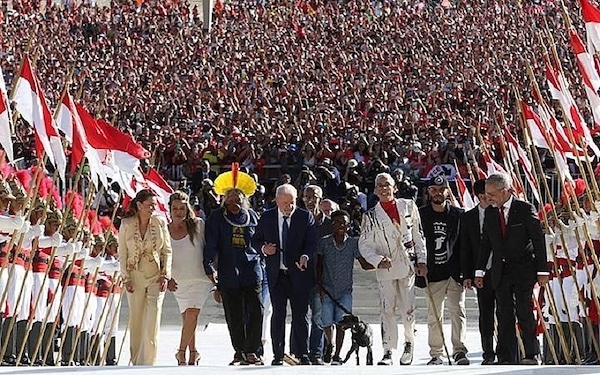The Lula administration (Workers’ Party) completes 100 days this Monday (10). Traditionally, this is the milestone in which a first assessment of the new presidential administration in the country is made, with the presentation of new measures to be adopted.
Brasil de Fato heard specialists and representatives of popular movements to find out how these first 100 days are being evaluated. Check out the highlights:
Defence of democracy
Vera Chaia, Professor of Politics at the Pontifical Catholic University of São Paulo (PUC-SP), highlights the actions of Flávio Dino (Ministry of Justice) in the face of the January 8 terrorist attacks.
“At first, Flávio Dino stood out the most, due to the need to reverse this process and bring peace to Brazilian politics, with an impressive arrest of Bolsonaro’s terrorist supporters on January 8th. Dino and Lula’s performance in the resistance was important in Brasília”, explains Chaia.
Economy
Chaia also highlights the management of Fernando Haddad (Workers’ Party) at the head of the Ministry of Finance with the construction and presentation of the fiscal framework.
He touched on the current sore spot, which is the economic part, with the whole minister’s proposal to improve the Brazilian economy, bringing another political arrangement to our economy.
For political scientist Mayra Goulart, the highlights were “the presentation of the fiscal anchor and the defense of an economy that prioritizes social policy and social development”. She also points out that Haddad and Simone Tebet, who heads the Brazilian Ministry of Planning,
positioned themselves forcefully, but without an open confrontation with the market.
Popular movements
Popular movements heard by Brasil de Fato point out that, for the first time since 2016 — when Michel Temer (Brazilian Democratic Movement Party) took over from Dilma Rousseff (Workers’ Party) in the presidency — there is an open dialogue with the federal instance and the possibility of taking dammed claims to Brasília.
They highlight, however, the apprehension and the demand for “concrete answers” to these guidelines, which have as their central point the regularization of indigenous lands, quilombola lands and settlements for agrarian reform. Last March 21, the government granted land titles to three quilombola communities. So far, settlements have not been regularized or indigenous lands demarcated.
In the view of Iury Paulino, from the national coordination of the Movement of People Affected by Dams (MAB), the challenge for the movements “is to defend the government from fascist attacks, but, at the same time, press for the advancement of popular agendas”. For Paulino, and on a more emergency basis, the government will have to take a position regarding the renewal of licenses such as that of the Belo Monte Hydroelectric Power Plant, whose construction expelled 55,000 people from their land and whose operation dries up the water for 130 kilometers of the Volta Grande do Xingu, in the Amazon.
“The recognition of our lands”, emphasizes Val Eloy Terena, coordinator of the Brazil’s Indigenous People Articulation (APIB), is “the main demand of the movement”, because “without territory, there is no way to discuss agendas such as health, education, politics for women, children and youth”.
For Dinaman Tuxá, APIB’s executive coordinator, “in practice, the government’s most incisive action was the task force to combat mining in the Yanomami indigenous land. We are also seeing the creation of dialogue to contain the most tense spaces, such as the creation of crisis offices for conflict areas”, mentions.
With regard to agrarian reform, the Landless Rural Workers Movement (MST) emphasizes that it “urges” to structure the National Institute for Colonization and Agrarian Reform (INCRA) and the definitive settlement of 65 thousand families who live in camps.
“INCRA is like Funai (National Indigenous Peoples Foundation) of the landless people in Brazil. It is the authority responsible for inspecting, classifying properties, contacting the owner, negotiating, acquiring, updating registrations”, explains José Damasceno, from the MST’s national directorate.
Environment
The “zero deforestation” policy was one of the main campaign promises, in contrast to the environmental dismantling left by Jair Bolsonaro (Liberal Party). Now president, Lula has implemented vital measures for the biomes preservation, but he still has not definitively reversed the destruction trend in the Amazon and the Cerrado. And experts predict that it won’t happen anytime soon.
Environmentalists heard by Brasil de Fato are confident that the results should appear in the upcoming years, as long as there is stricter inspection and fewer concessions to agribusiness.
Ane Alencar, Director of Science at the Amazon Environmental Research Institute and coordinator of the Cerrado and Fogo biomes at MapBiomas, says that data from the Real Time Deforestation Detection System (Deter) indicate a significant reduction in deforestation up to March 24: in the Amazon it went from 941 km² to 710 km² and, in the Cerrado, from 1288 km² to 1244 km².
“It is already something to celebrate, especially in the case of the Amazon. But we need to consolidate this reduction. And this consolidation will happen as the government becomes more structured and organized,” says the MapBiomas member.
The Brazilian Environmental Governance Observatory (OGAM), created in 2022, calls on the Lula government to expand civil society participation in the National Environmental Council (Conama). The organization is the most important for dialogue between the federal government and civil society, but it had been emptied by Bolsonaro.
Edited by: Flávia Chacon
Translated by: Lucas Peresin

